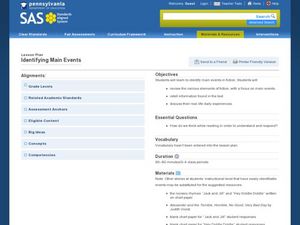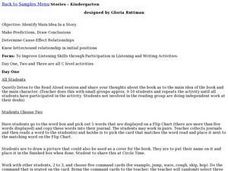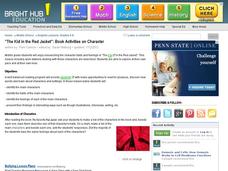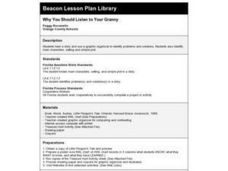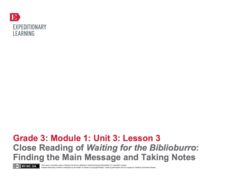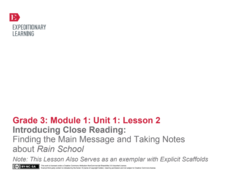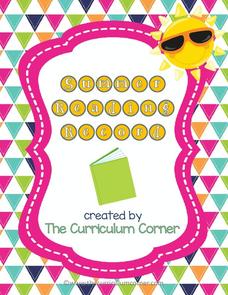Curated OER
Lesson Plan 4: Creating Main Characters
Creating a good main character is a must when writing a creative narrative or novel. Elementary aged writers create main characters for the novel they are writing. They first use themselves as a models, then create a character as a...
Curated OER
Introduction to Main Events
Identify main events in a text. Readers will read The Kissing Hand and discuss the main events of the story. They will use sentences strips to write down events and place them in order. Alternative books are suggested.
Curated OER
Identifying Main Events
Help kindergartners learn to identify the main events in fiction. They will review elements of fiction, retell information found in the text, and discuss their real-life daily experiences. All the while, they will be asking themselves...
Curated OER
Identify Main Idea in a Story
Help your kindergarteners identify the main idea in a story. Small groups work with the teacher to make predictions and draw conclusions. They are able to determine cause and effect relationships. The lesson is divided into several days,...
Bright Hub Education
"The Kid in the Red Jacket": Book Activities
Learning stations aren't just for little ones; middle schoolers can have fun while learning about the main character in the book, The Kid in the Red Jacket. Outlined are three different activities that are completed as each small group...
Scholastic
Developing a Main Character
Asking kids to craft their own stories? Get them starting with a character planning sheet that asks them to identify the character's likes and dislikes, his or her strengths and fears, a goal the character wants to achieve, and the...
Virginia Department of Education
Identifying the Main Idea in Fiction
Discovering the main idea in fiction is like uncovering buried treasure; one must persevere to locate it, and the reward is priceless. Scholars delve deep into leveled stories using three questions to aid in identifying the main idea.
Curated OER
WHY YOU SHOULD LISTEN TO YOUR GRANNY
Learners hear a story and use a graphic organizer to identify problems and solutions. They also identify main characters, setting and simple plot. They illustrate one situation when they should listen to their parents.
Curated OER
Lesson Plan 10: Writing Really Good Dialogue
Boring dialogue can run a great story into the ground; get your novelists using dialogue as a tool to move their story into deeper and more developed territory. As part of a larger writing series, this lesson has a worksheet that can...
Curated OER
The Frog and the Scorpion
What a creative means to discuss main characters and adjectives. Learners read a short story about a frog and a scorpion, discuss the characters' actions, and identify adjectives. This technique could be used to review a variety of...
Curated OER
Story Spinners
Students read a book orally using a "Snaking It" technique. The students make a curvy path around the room and take turns reading a sentence orally. They then create a project using paper plates and colored pencils to identify the main...
EngageNY
Close Reading of Waiting for the Biblioburro: Finding the Main Message and Taking Notes
Expose your class to Waiting for the Biblioburro, narrative nonfiction that will act as the bridge between ficiton and informational texts to come. Class members do a close reading of the text, looking at excerpts instead of the whole...
Curated OER
Puss in Boots/Jamil and the Clever Cat
Second graders read the story PUSS IN BOOTS identifying main characters, setting, and significant events. They then read the story JAMIL AND THE CLEVER CAT and compare it with the story PUSS IN BOOTS compiling a list of characters,...
Curated OER
Lesson Plan 7: The Elements of Story
Budding novelists work on character development by relating to the characters in their stories. They imagine their own hopes and dreams and recall those of characters from books they've read. Learners also consider struggles the...
EngageNY
Introducing Close Reading: Finding the Main Message and Taking Notes About Rain School
This second lesson in a larger unit is perfect for the beginning of the year because it explicitly teaches 3rd graders how to use close reading skills by identifying unfamiliar words, figuring out the gist, and defining important...
Curated OER
Main and Secondary Characters
Identify main and secondary characters from a fiction story. Kindergartners do a picture walk with the teacher, and then do the identifying on their own with another book. A good assignment for groups or a whole class to complete.
EngageNY
Close Reading of The Boy Who Loved Words: How Do People Build Their Word Power?
Third graders practice the skills of identifying the main message in a story, describing the main character, and sorting the key details of a story into specific categories. The story they read is, The Boy Who Loved Words. Using a...
Curated OER
Comprehension: Identify Story Grammar
This fully scripted lesson could be a big help for someone new to teaching Kindergarten. It outlines what you should do and say as you teach grammar and literary elements such as, main character, setting, and events through reading. The...
Curated OER
A Midsummer Night's Dream
Middle schoolers explore the book A Midsummer Night's Dream. In this literature lesson, students identify main characters and vocabulary words from the text. Middle schoolers participate in a book discussion group.
Curated OER
Nursery Rhymes
Students recall details of nursery rhyme read by teacher, identify main characters, and demonstrate knowledge of poem by creating concept map about story that includes title, clip art, and changes in font and color.
Curriculum Corner
Summer Reading Record
No more summer reading lag! Give young readers a set of graphic organizers and worksheets to keep track of the books they read over the summer and to keep reading comprehension skills fresh. The graphic organizers include identifying...
Curated OER
Because of Winn-Dixie
Readers analyze an excerpt from Kate DiCamillo's novel Because of Winn-Dixie. They read silently, and then hear it read aloud. Definitions for underlined vocabulary words are in the margin, and other potentially difficult words are in...
Ed Helper Clip Art
Character Problem Solution
Intended for younger audiences, children identify the main characters, setting, problem, events, and solution in a graphic organizer.
Curated OER
Inferring Character Traits
Here is a lesson plan which is "flexible," and can operate as an individual or whole class activity. After reading a book of their choosing, with the use of a semantic map, learners identify character traits. They infer how their...




